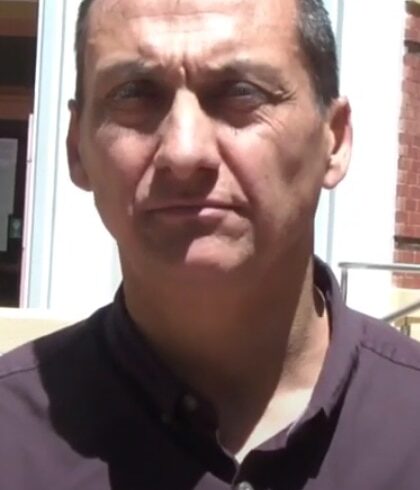
A criminology researcher says rewards do work as a way of catching people, even if the success rate appears low.
Victoria Police last week announced a reward of up to $1 million for information leading to the arrest of Dezi Freeman, the man accused of killing two Victoria Police officers and injuring a third in Porepunkah last month.
Police said the reward was not “an act of desperation” but hoped it would motivate people who may be helping the fugitive or have information to come forward.
“If you put out 100 rewards and only one person comes forward, but it solves a crime, my argument would be they’re still effective,” Bond University associate professor and former police officer, Terry Goldsworthy, said.
“As long as you solve a crime, it’s achieved a positive.
“If we hadn’t done the reward, we wouldn’t necessarily have solved that matter.”
Police are offering a $1 million reward for information that leads to Dezi Freeman’s arrest. (Supplied)
Dr Goldsworthy said Mr Freeman’s case reflected a shift in how rewards were being used.
“We used to see them offered when investigations had been frustrated, when all traditional techniques had been exhausted. They were generally for cold cases,” he said.
“But what you’ve seen in recent years, and we saw it in the Cleo Smith case in Perth, is police using rewards very early to generate information.
“They’re trying to move from a low information state to a high information state.”
Terry Goldsworthy says rewards are being used earlier in police investigations. (ABC News: Michael Lloyd)
He said offering a reward for an arrest, rather than a conviction, could make it more enticing.
“In this case, I think the reward isn’t necessarily there for solving the matter … there are plenty of first-hand witnesses,” Dr Goldsworthy said.
“They’re looking to locate the suspect.”
But Dr Goldsworthy said people eyeing the full $1 million reward could be disappointed.
“It’s a bit like the lotto,” Dr Goldsworthy said.
“You might find someone gets $100,000, someone else $250,000.
“It really depends on who comes forward and how important their information is.”
A police helicopter flies over Porepunkah in early September. (ABC News)
The price of justice
Victoria Police has more than 190 rewards on offer for information about serious offences.
Crimes including murder and large-scale commercial drug trafficking, both of which can carry a life sentence in prison, can attract rewards of up to $1 million.
The $1 million reward for Mr Freeman’s arrest is the only one currently being offered for capture, not a conviction.
A Victoria Police spokesperson said rewards were designed to send a clear message that police were determined to bring those responsible to justice.
Detective Inspector Dean Thomas announced the $1 million reward last week. (ABC News)
“It is our hope that as circumstances in the lives of people who have information about these crimes changes, that they do come forward and provide information to police,” the spokesperson said.
“However, every case and therefore every reward strategy is different.
“Often, we only get one chance to announce a reward and so we have to ensure we make the best use of the announcement.”
The spokesperson said when determining a reward, each case was assessed on its merits.
“It’s important to understand that reward amounts do not represent the value of someone’s life, nor do they indicate the desire of police to solve a particular case,” the spokesperson said.
Under the current system, an application is submitted, considered by a committee, and if approved, a reward is announced.
In 2012, changes were made to the rewards process to align with the maximum penalty for the relevant crime.
The process also allows for rewards to be reviewed and upgraded.
Bounty hunter risks
Retired Victoria Police homicide detective Charlie Bezzina said the reward for information on Mr Freeman was unusual because it applied to an arrest, not a conviction, and could encourage people to act in potentially dangerous ways.
“The unintended consequence is the bounty hunter situation you see in America,” he said.
“Who knows, people might take it upon themselves and think ‘I’m a great bush person’.
“It’ll be taking your life in your own hands if you want to go and traipse into the bush with a view of claiming the reward.”
Charlie Bezzina says police rewards are not often claimed. (ABC News: Nicole Asher)
Mr Bezzina said police rewards were “rarely claimed” despite their frequent use.
“In general, when we place rewards for information leading to the arrest and conviction of an offender, they’re not that effective,” he said.
Mr Bezzina said he could only remember two successful claims made during his decades in the force, including one where a $50,000 reward was paid.
He said many people in the community did not want to touch reward money.
“With the criminal fraternity, they may not want to be in that sort of situation,” he said.
“And for good people in the community, they often see it as blood money.
“They’ll just say, ‘I want to give information because that could have been my loved one’ or whatever the offence may well be.”





